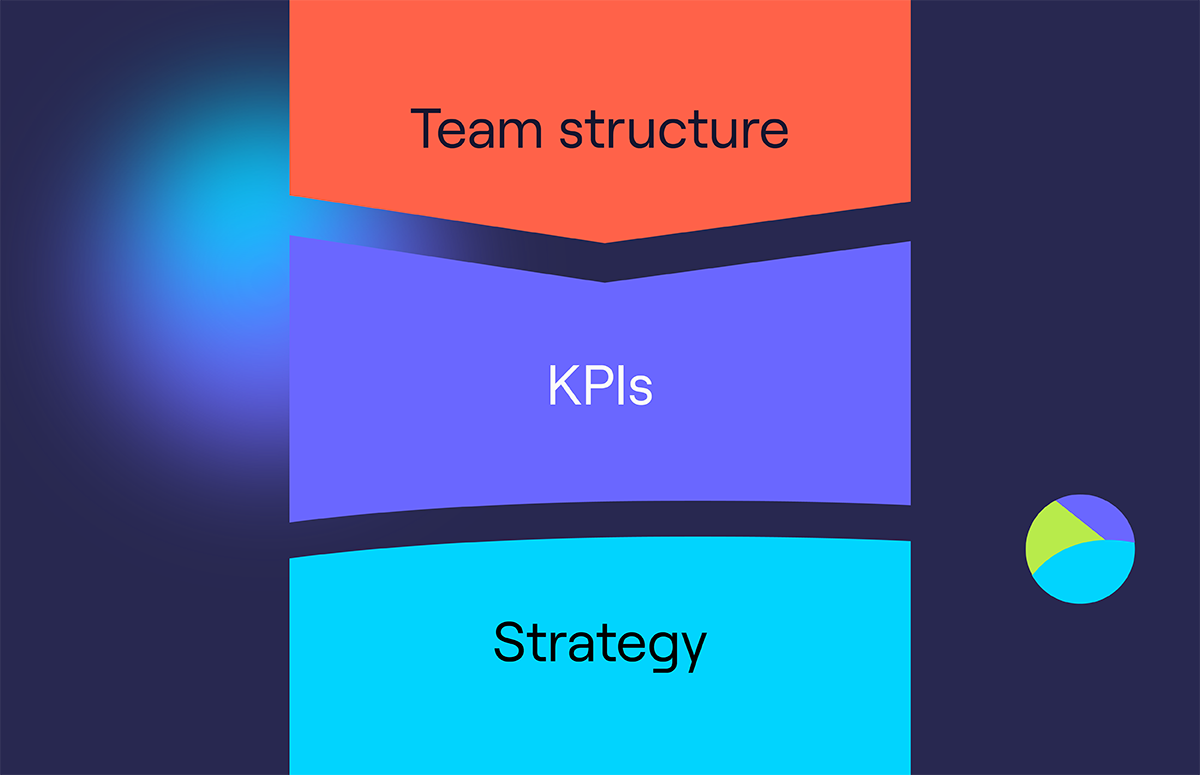What is a Revenue Operations Manager?
Revenue operations manager menu:
Do you need someone on your team who can streamline your operations, increase revenue, and drive growth?
Of course you do! You need a revenue operations manager.
In this post, we’ll cover what a revenue operations manager does, the skills they need to perform their job well, and give you tips on what to look for when you fill this critical role.
What does a revenue operations manager do?
Revenue operations (RevOps) managers are vital team members. They ensure your business operations move in the right direction.
But what does this pivotal role do?
A revenue operations manager oversees and combines your sales, marketing, and customer success strategies. Their goal is to discover opportunities for improvement across your entire revenue process.
They look at every part of your revenue cycle, from lead generation to onboarding to upselling and customer support. They ensure you’re maximising every opportunity to generate revenue.
Jon Morgan, CEO and Editor of Venture Smarter, explained it like this. He said:
“A RevOps manager’s primary responsibility is to ensure that all revenue-generating functions operate in harmony.”
“This includes optimising processes, unifying data systems, and enabling teams to work toward shared goals. Their work involves breaking down silos between departments, creating smoother workflows, and leveraging data to inform strategy.”
In other words, they’re magicians working behind the scenes to ensure each department’s strategies make business magic happen - more sales and revenue growth!
If some aspects of revenue operations are a bit off, the RevOps manager works with individual departments to fix the issue. They typically use data and insights to help guide those decisions. For growing companies not ready for a full-time hire, hiring a fractional COO with RevOps expertise can provide similar benefits with greater flexibility.
They’re also responsible for scaling processes and overseeing the revenue tech stack.
👉 Take control of your revenue strategy with high-quality data that grows your pipeline. Here’s how Cognism helps RevOps leaders.
What key skills does a revenue operations manager need?
Since RevOps managers work closely with nearly every department, they carry a specialised skillset.
Let’s look at the skills revenue operations managers need to succeed in their roles.
1. Analytical skills
RevOps managers need to be highly analytical. Jon told us this is one of the more essential skills in their toolboxes:
“To excel in this role, a RevOps manager needs analytical skills, proficiency in tools like CRM platforms, and a strong grasp of business metrics.”
Revenue operations managers use data to help them make informed decisions. They analyse reports and processes to ensure each department’s strategies work towards the overarching business goals.
So, your RevOps manager needs strong analytical prowess!
2. Technical skills
Most jobs require some level of technical skills, and it’s no different for revenue operations managers.
RevOps managers work with:
- The CRM.
- Analysis tools, like AI-powered software that visualises complex data sets.
- Sales and customer support software.
These RevOps tools require some technical knowledge, especially to understand workflows and how to optimise them best.
3. Strategic thinking skills
Edward White, Head of Growth of beehiiv, said RevOp managers need to be skilled strategic thinkers.
He told us the position involves identifying inefficiencies and offering viable solutions to those problems:
“Top RevOps managers excel in data interpretation and strategic planning.”
“It’s a must that we know how to turn analytics into actionable insights, ensuring better forecasting, streamlined processes, and improved cross-department communication.”
4. Communication and collaboration skills
These may be classed as soft skills, but they’re essential for most jobs, especially revenue operations managers. Jon said:
“Communication and leadership abilities are key. RevOps managers need to align cross-functional teams and champion initiatives.”
Staying on top of communication and knowing how best to communicate a message or strategy are essential skills in RevOps!
5. Adaptability and organisational skills
RevOps managers must be skilled adapters and organised in their daily job functions.
Each day will present new challenges to solve and business functions to optimise.
What qualifications does a RevOps manager need?
Edward told us:
“The best qualifications for a RevOps manager aren’t just certifications or degrees - they’re a mix of technical expertise, strategic thinking, and leadership capabilities.”
“While proficiency in tools like Salesforce, HubSpot, and Tableau is essential, the ability to create a unified system across disconnected teams is what sets good managers apart.”
If you’re looking at qualifications, then a bachelor’s degree in finance, marketing, or business is beneficial. Three to five years of experience in customer success, sales, or marketing can also help.
This experience can help a RevOps manager better understand individual departments’ processes and strategies.
How does a revenue operations manager contribute to business growth?
If you’re working in a B2B company, you need a revenue operations manager to help put the pieces of your business together and ensure a smooth transition from one department to another.
In their daily work, RevOps managers take on a strategic role. They implement revenue growth strategies supported by data-driven insights. Their goal is to help department heads achieve their goals - and ensure that one department doesn’t accidentally sabotage another.
Edward said:
“We reduce inefficiencies and improve funnel performance.”
“For example, by refining lead handoff protocols, we can cut delays by hours, and by automating key tasks, we free up teams to focus on higher-impact work. These efficiencies directly translate to increased revenue and faster growth.”
And that’s the selling point for revenue operations managers:
They keep a pulse on the customer experience, reducing inefficiencies at every sales and revenue cycle touchpoint.
Revenue operations manager vs. sales operations manager: What’s the difference?
If you already have a sales operations manager, you might wonder, what’s the difference between them and a RevOps manager?
It’s a good question, as some of their job functions overlap.
However, Edward made a clear distinction between these two roles:
“Sales ops managers focus primarily on supporting and optimising the sales team’s performance.”
“Their responsibilities typically include refining sales processes, managing tools like CRMs, and ensuring that sales reps have the resources they need to close deals efficiently. The scope is narrower, with the primary goal being to maximise the sales team’s effectiveness.”
“RevOps managers, on the other hand, take a broader, more holistic approach. They work across sales, marketing, and customer success to ensure all these teams are aligned and contributing effectively to the organisation’s overall revenue strategy.”
“Their focus extends beyond just closing deals to include improving lead quality, streamlining customer onboarding, and driving long-term retention.”
So, while your sales operations manager looks at one slice of the pie, your RevOps manager looks at the whole pie and considers ways to make it more appealing to everyone.
Read this blog to learn more about the differences between RevOps vs. sales ops.
How much does a revenue operations manager typically earn?
If you’re considering hiring a revenue operations manager, it’s helpful to get a ballpark idea of a salary range to offer qualified candidates.
In an average year, a revenue operations manager in the US might make between $100,000 and $130,000.
However, a RevOps manager in the UK might earn between £33,000 and £60,000 a year, which is lower than the US average.
Keep in mind that average salaries fluctuate between industries, company sizes, locations, and expertise.
Top tip:
Research your competitors’ salary ranges to ensure you offer an attractive salary to qualified RevOp managers.
What are some tips for hiring revenue operations managers?
By now, it’s clear a RevOps manager is an essential role you need on your team.
To help you hire the best person for your company, keep these tips in mind.
1. Clearly define the role
When writing the RevOps manager’s job description, clearly define the role.
Because RevOps is closely related to sales operations, you must ensure your team (and your applicants!) understand the differences between the two positions.
2. Assess for strong leadership
Once you have candidates in mind, take the time to assess their skills.
You’ll want to review their leadership and technical skills:
- A RevOps manager will be in charge of the tech stack, so they’ll need to be tech-savvy.
- They must also possess leadership skills to take charge, revise strategies, and change direction if necessary.
3. Consider promoting from within
A RevOps manager’s position is technical and requires broad knowledge of your business processes.
The best candidates often have prior expertise in customer success roles, marketing, and sales.
Because you want an employee who has a keen understanding of your business and your customer base, it might be best to promote a current employee to this role.
In which case, look for a candidate, either a current employee or an applicant, who is highly adaptable and can easily manage changing company objectives.
What are the common challenges for revenue operations managers?
The RevOps manager is tasked with ensuring the efficiency of your revenue-generating operations. This includes cross-functional coordination between departments.
Because of this, they’re bound to face a few challenges along the way.
One of the biggest challenges they face is often department resistance to changing or re-aligning their long-term strategies. So, it’s critical that your RevOps manager has the necessary skills to lead new initiatives and collaborate with all your revenue teams.
Another major challenge is gaining access to quality data. RevOps managers need access to consistent, accurate, and clean data to ensure they make the best, most informed decisions company-wide.
Hint: Cognism can help you out here!
How can Cognism solve your RevOps challenges?
Your revenue operations manager is a vital part of your team.
Depending on your company’s size, your RevOps manager might be a department of one. However, this doesn’t mean they operate solo. Their role requires constant collaboration between departments.
Cognism can make this process easier. Our AI-powered sales intelligence platform centralises your business data and helps you discover new growth opportunities.
Here’s what we offer:
- Signal data for real-time data insights.
- Connect with more decision-makers and close deals faster.
- Generate high-quality leads that convert.
- Eliminate manual research and data entry.
- Ensure data privacy and adhere to regulations.
Want to see how it works? Click 👇 to book a demo.
/CTAs%20(SEO)/cognism-lead-generation-demo-webp.webp?width=672&height=258&name=cognism-lead-generation-demo-webp.webp)
/Lead%20routing%20tools/lead-routing-tools-resource-card.webp)

